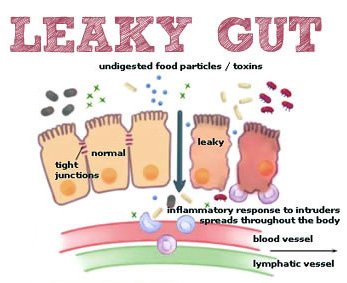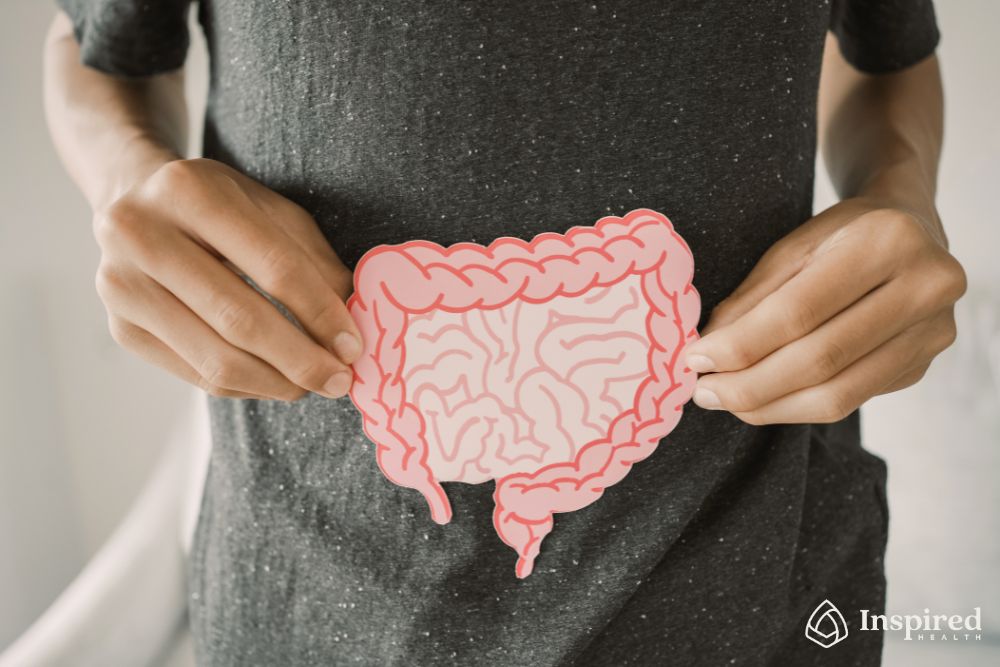What is Leaky Gut?
Leaky gut, also known as increased intestinal permeability, is a condition where the lining of the digestive tract becomes damaged. This damage causes tiny gaps or “leaks” in the system, allowing harmful substances like toxins, undigested food particles, and bacteria to enter the bloodstream. These substances can trigger widespread inflammation and disrupt normal immune function, which may lead to a variety of health issues.
While leaky gut is still a topic of ongoing research and discussion in the medical community, emerging studies suggest that it may be a contributing factor to many chronic conditions, including digestive disorders, autoimmune diseases, and even hormone imbalances.

How Leaky Gut Affects Hormone Health
Your gut is often referred to as your “second brain” due to its powerful influence on various bodily functions, including hormone regulation. Here’s how leaky gut can interfere with your hormonal health:
1. Increased Inflammation
One of the most significant consequences of leaky gut is chronic inflammation. When the gut lining is compromised, harmful substances leak into the bloodstream, prompting an immune response. This leads to systemic inflammation throughout the body, which can disrupt hormone production and signaling.
For example, inflammation can interfere with the normal function of the adrenal glands, which produce cortisol, the body’s primary stress hormone. Prolonged stress and elevated cortisol levels due to chronic inflammation can contribute to hormone imbalances, leading to symptoms like fatigue, anxiety, weight gain, and irregular periods, just to name a few.
2. Impaired Estrogen Metabolism
Estrogen, the primary female sex hormone, plays a crucial role in many bodily functions, including reproductive health, bone density, and mood regulation. The liver is responsible for metabolizing and excreting excess estrogen from the body, but gut health plays a vital role in this process. The gut houses a variety of beneficial bacteria that help metabolize estrogen and support the liver’s detoxification processes.
In the case of leaky gut, the imbalance of gut bacteria and increased intestinal permeability can impair estrogen metabolism. This can lead to an accumulation of estrogen in the bloodstream, a condition known as estrogen dominance. Estrogen dominance is linked to a variety of symptoms, including bloating, weight gain, mood swings, and even conditions like fibroids and endometriosis.
3. Disruption of Thyroid Function
The thyroid is a small gland in the neck that produces hormones responsible for regulating metabolism, energy levels, and overall growth and development. Research has shown that there is a strong connection between gut health and thyroid function. Leaky gut can disrupt the gut’s ability to absorb essential nutrients that the thyroid needs to function properly, such as iodine, zinc, and selenium.
Furthermore, chronic inflammation associated with leaky gut may interfere with the conversion of the thyroid hormone T4 into its active form, T3. This can lead to hypothyroidism, a condition characterized by symptoms like fatigue, weight gain, and depression. Conversely, leaky gut may also contribute to an overactive thyroid (hyperthyroidism) due to hormonal imbalances.

4. Insulin Resistance and Blood Sugar Imbalances
Leaky gut is also linked to insulin resistance, a condition in which the body’s cells become less responsive to insulin, leading to higher blood sugar levels. When the gut is inflamed, it can release substances that trigger insulin resistance, causing blood sugar levels to spike. Over time, this can lead to metabolic disorders, such as type 2 diabetes, and contribute to imbalances in hormones like insulin, leptin, and ghrelin—hormones involved in hunger and metabolism.
5. Gut-Brain Axis and Mood Disorders
The gut-brain axis is the two-way communication system between the gut and the brain. Research has shown that gut health plays a significant role in the regulation of neurotransmitters like serotonin and dopamine, which are involved in mood and emotional well-being. Leaky gut can disrupt the balance of these neurotransmitters, potentially leading to mood disorders like anxiety and depression. Furthermore, imbalances in serotonin and dopamine can also affect the production of hormones like cortisol, which further disrupts hormonal balance, as discussed above.
Supporting Gut Health for Better Hormone Balance
The good news is that you can take steps to support your gut health and, in turn, help restore balance to your hormones. Though every body is unique and there are some digestive conditions that won’t benefit from everything mentioned below, here are some general tips to get you started:
1. Eat a Gut-Friendly Diet
A healthy diet is one of the most effective ways to support both your gut and hormonal health. Focus on consuming whole, nutrient-dense foods like:
- Fiber-rich vegetables (e.g., leafy greens, cruciferous vegetables)
- Fermented foods (e.g., sauerkraut, kimchi, kefir, yogurt)
- Healthy fats (e.g., avocado, olive oil, fatty fish)
- Protein-rich foods (e.g., grass-fed meat, eggs, legumes)
Avoid processed foods, refined sugars, and inflammatory oils that can damage the gut lining and disrupt hormone function.

2. Take Probiotics and Prebiotics
Probiotics are beneficial bacteria that help maintain a healthy gut microbiome, while prebiotics are fiber-rich foods that nourish these bacteria. Consider taking a high-quality probiotic supplement or incorporating more prebiotic-rich foods like garlic, onions, and bananas into your diet.
3. Manage Stress
Chronic stress can worsen leaky gut and hormone imbalances. Practice stress-reducing techniques like meditation, yoga, deep breathing exercises, or spending time in nature to help manage cortisol levels and support gut healing.
4. Prioritize Sleep
Adequate sleep is essential for hormone regulation and overall health. Aim for 7-9 hours of quality sleep each night to support your body’s natural healing processes, including those related to gut health.
5. Consult a Health Professional
If you suspect you have leaky gut or are experiencing hormone imbalances, it’s important to consult with your doctor. At Inspired Health, we utilize a series of functional medicine tests to help assess your gut health and develop a personalized treatment plan to get both your gut and hormones functionally optimally.

Want more Inspired tips?
Be sure to follow us on Instagram, Facebook, and Pinterest.
Also, sign up for our newsletter!
Visit us in-person at Inspired Health, or schedule a TeleHealth appointment!
References:
- Baker JM, Al-Nakkash L, Herbst-Kralovetz MM. Estrogen-gut microbiome axis: Physiological and clinical implications. Maturitas. 2017 Sep;103:45-53. Epub 2017 Jun 23.
- Di Vincenzo F, Del Gaudio A, Petito V, Lopetuso LR, Scaldaferri F. Gut microbiota, intestinal permeability, and systemic inflammation: a narrative review. Intern Emerg Med. 2024 Mar;19(2):275-293. Epub 2023 Jul 28.
- He S, Li H, Yu Z, Zhang F, Liang S, Liu H, Chen H, Lü M. The Gut Microbiome and Sex Hormone-Related Diseases. Front Microbiol. 2021 Sep 28;12:711137.
- Zhang H, Wang Z, Wang G, Song X, Qian Y, Liao Z, Sui L, Ai L, Xia Y. Understanding the Connection between Gut Homeostasis and Psychological Stress. J Nutr. 2023 Apr;153(4):924-939.






